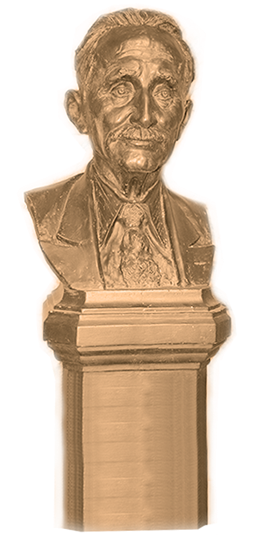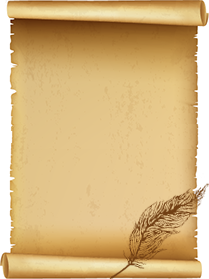
BIOGRAPHY
The life of Shaig
Abdulla Shaig was a prominent Azerbaijani poet, writer and educator who left behind a rich literary heritage. His multifaceted work included poetry, prose, theatrical plays as well as literary translations, research, teaching and public service. He is widely considered the founder of the Azerbaijani children’s literature and drama. His many literary, academic and pedagogical works have influenced generations of people in Azerbaijan and beyond, and have contributed to formation of the Azerbaijani national identity.
Abdulla Talibzadeh was born on February 24, 1881 in Tiflis, the cultural centre of South Caucasus of that time. His pen name “Shaig” is derived from Arabic, the root “Shovg” meaning “light”. His father, Akhund Molla Mustafa Talibzadeh was a religious figure and connoisseur of oriental culture. He was a deputy cadi of Tiflis and later served as first deputy to Sheikh ul Islam in the Religious Department. In 1889, Abdulla’s mother Mehri khanum took her sons Yusif, who would later become a religious leader, educated man and freedom fighter, Abdulla, and her daughter to Khorasan, Iran where the boys were enrolled in the newly opened school of Mirza Yusif from Urmia. By that time Abdulla had completed his primary education in six-year Muslim town school in Tiflis.
Although he received religious education which made him fluent in Arabic and Persian, Abdulla had no interest in further pursuing religious studies and was attracted to worldly science and knowledge and in particular to classic literature. He thoroughly studied Persian language and literature, Turkic grammar, logic, psychology and world history. At the age of 16, he started writing ghazals under the influence of the lyrical poetry of Fuzuli. Abdulla translated to Persian the fables “Quartet”, “Two Bulls”, “The Crow and the Fox”, “The Monkey and Glasses” and “The Wolf and the Cat” by Russian satirical poet Krylov. The successful translations awakened in him desire to engage in literature.
In 1901, Abdulla settled in Baku where, having successfully passed an exam, he was granted the right to teach Azerbaijani language in secondary schools.
In 1903-1907 Shaig taught Azerbaijani language in Sabunchi six-year school under the guidance of the school principle Habibbek Makhmudbekov. In 1908 he started teaching in the Third Gymnasium. During these years Abdulla studied classical Azerbaijani literature, wrote poems and short stories, and closely studied Russian language and literature.
The central themes of his works written in the course of 1907-1910 were love for his people and fight for freedom. These works included short stories and poems Məktub yetişmədi (Undelivered Letter), Hürriyyət pərisinə (To the Angel of Freedom), Yad et (Remember), Intiharmı, yaşamaqmı? (Suicide or Life?), Hamımız bir gunəşin zərrəsiyiz (We Are All Rays From the Same Sun), Köç (Encampment), Son bahar (The Last Spring), Cəhalətlə mücadilə (The Fight with Ignorance).
Throughout his literature work Abdulla Shaig paid particular attention to patriotic upbringing of children and cultivation of national spirit and love for Motherland.
In 1906-1907 Shaig was elected secretary and member of the programming commission at the 1st and 2ndTeachers’ Conventions which were held in Baku.
In 1910-1913 Abdulla Shaig wrote Gözəl bahar (Beautiful Spring), the first theatrical play for children in the history of Azerbaijani literature. With this work Shaig has laid foundation of children’s playwriting in Azerbaijan. During the same years he created his famous poetic and prosaic stories Yaxşı arxa (Good Friend), Tıq-Tıqxanım (Lady Tig-Tig), Tülkü həccə gedir (Fox goes on a pilgrimage), Şələquyruq (Bushy Tail). His first children’s play Gözəl bahar (1910) was successfully staged and the money collected from ticket sales were spent on purchasing school stationery, textbooks and other necessary school equipment. Later, he wrote a number of plays to enrich the repertoire of the national theater.
Apart from his work in literature, Abdulla Shaig taught in the Real School and worked on new school curriculum. He produced a number of textbooks including Uşaq gözlüyü (Child Eyeglasses), Türk çələngi (Turkic Bouquet), Türk ədəbiyyatı (Turkic Literature), Milli qiraət kitabı (National Reading Book), Gülzar. He also co-authored a textbook İkinci il (The Second Year).
In 1918 Shaig opened first national classes in the Real School and completed his novel Əsrimizin qəhrəmanları (Heroes of Our Century). He wrote poems Ülkər (1919), O sən idin (It Was You) 1919, Həyat sevməkdir (Life Means Love),1919 and others. He also prepared for publication the textbooks Müntəhabat (Reader), Türk çələngi (Turkic Bouquet), Ədəbiyyat dərsləri (Literature Lessons).
From 1934 Abdulla Shaig worked as editor at the Department of children’s literature of the Azerbaijani State Publishing House (Azerneshr), and from 1937 he managed artistic educational department of the Young Spectators Theater. During this time his plays Xasay (Khasay), 1937, Eloğlu (Son of The Nation), 1939, Vətən (Motherland), 1941 were successfully staged in the Theater.
He also continued to create literary works including poems Gənclik marşı (Youth March), 1921, Üsyan et (Rise), 1921, Şərq gözəlinə (To Oriental Beauty), 1921, Qızım Altunsaç (My daughter Altunsach), 1922, Bizimdir (This Is Ours), 1922, Azadlıq pərisinə (To the Angel of Freedom), 1924, Əmək pərisinə (To the Angel of Labour), 1924 and others.
December 1923 marked the 20th anniversary of literary and pedagogical activities of Abdulla Shaig. On this occasion, the school under the Azerbaijani Pedagogical Institute in which Shaig taught was renamed as Exemplary School of Shaig in recognition of his exceptional contribution to the development of education and pedagogy in Azerbaijan.
Staging of Shaig’s plays Həqiqətə dair (On Truth), 1921, Yazıya pozu yoxdur (Never write what you dare not sign), 1921, Xasay and Eloğlu, 1939, publication of the book İldırım (Thunder), 1927 and translation of Shakespeare’s Makbeth brought him fame as a playwright. In the Young Spectators Theater he had an opportunity to continue producing plays and the repertoire of the Theater was significantly enriched with Shaig’s plays such as Vətən (Motherland), Ana (Mother), Nüşabə (Nushaba), Fitnə (Fitneh), Bir saat xəlifəlik (King For a Day). In 1940s Shaig was officially honoured for his services to art.
Along with his poems and short stories, Shaig was also known for his literary translations of pieces from Oriental and Western literature. His translations to Azerbaijani language of Ferdowsi, Shakespeare, Pushkin, Krylov, Lermontov, Gorky, Chekhov and others continue attracting wide attention from readers.
In 1946-1956 Shaig was elected member of the Supreme Soviet of the USSR. During the same years he was awarded an Order of Red Banner of Labour and other medals and was honoured for his services to education.
Abdulla Shaig died on 24 July 1959 in Baku at the age of 78 and was buried in the National Memorial Cemetery (Fakhri Khiyaban).
Memorials
House Museum of Abdulla Shaig was opened on 24 February 2001 by Decree of the National Leader Heydar Aliyev. A street, a school, and the State Puppet Theater in Baku and city library in Mingachevir were named after Abdulla Shaig.
“Yad et”
Atəşli, münir əməllərimlə,Bir gün düşərəm soyuq məzarə,
Əşari – təranəpərvərimlə
Bir gün susaram dönüb qubarə.
Vaqta ki, bu şairi vətəndən
Dünyada nə iz qalar, nə bir nam,
Üzdükcə səadət içrə şən-şən,
Sürdükcə dəmadəm ömrü xoşkam,
Yad et məni – qaibanə yad et!
![]()
1908

Copyright © 2016 - 2019 - House museum of Abdulla Shaig
Sayt "IT Service" MMC tərəfindən hazırlanmışdır
Bütün hüquqları qorunur.
